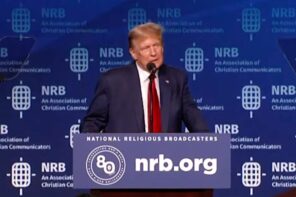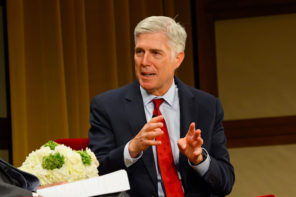The notorious Alliance Defense Fund, which seeks to abrogate the establishment clause of the First Amendment, is at it again.
It appears that they have recruited an evangelical minister, H. Wayne Williams of Liberty Baptist Tabernacle in Rapid City, to endorse a candidate for governor from the pulpit in hopes of taking his case all the way to the Supreme Court. Such advocacy, of course, violates the Johnson Amendment, which prohibits any 501(c)(3) nonprofit organization from making political endorsements.
Williams, for his part, seems to relish his role as a rogue. As quoted in the Washington Times, the preacher asked, “Why is it that I cannot walk with my Master, my Lord, in speaking on government issues?” Williams even had the temerity to invoke Roger Williams (no known relation), the progenitor of the notion of church-state separation. “I would welcome the history of my Baptist forefathers in going to jail over these issues,” Williams said. “I will not be silenced by intimidation.”
I guess I was unaware that Roger Williams was receiving tax exemptions from the Massachusetts Bay Colony.
And what is the object of H. Wayne Williams’ ardor? Williams endorsed Gordon Howie (not to be confused with hockey great Gordie Howe) in his unsuccessful bid to be the Republican nominee for governor of South Dakota [See Mark Bergen’s earlier post here —Eds.]. According to his Web site, Howie is a realtor and “The Tea Party Republican” candidate for governor. His positions appear to be boilerplate hard-right conservative (guns, “pro-life,” “traditional values”), although if his mode of governing in any way resembles his dysfunctional Web site, the people of South Dakota would have been in for a helluva ride with Howie as their governor.
Here’s some unsolicited advice for H. Wayne Williams. As an American citizen, you’re free to walk with your Master, your Lord, and endorse anyone you choose. But the Johnson Amendment, upheld by the courts over the decades, stipulates that you cannot make any such endorsement on behalf of a tax-except organization—which is only one of the reasons that your appeal to Roger Williams is misguided. What you’ve failed to consider is that tax exemption amounts to a public subsidy because the inability of federal, state and local governments to collect taxes from your church means that other taxpayers have to shoulder more of the burden. I’m not arguing here whether that’s good or bad; it’s just the way it is.
In return for that public subsidy, Congress determined (sensibly) that any such taxpayer-subsidized organization should not be in the business of endorsing political candidates. That’s the deal. Now if you persist in flouting the law, I invite you to do the honorable thing and surrender your church’s tax-exempt status. Then no one would quibble with your political endorsements.
The other, more important reason that your appeal to Roger Williams is misguided, Rev. Williams, is that Roger Williams, founder of the Baptist tradition in America, recognized the perils to the faith of political entanglements. Let’s recall that Roger Williams wanted to separate the “Garden of the Church” from the “Wilderness of the World” by means of a “Wall of Separation.” Roger Williams recognized long ago that the faith would be compromised and trivialized by conflating it with the state. The founders, in their wisdom, incorporated that principle of church-state separation into the First Amendment to the Constitution, thereby setting up a free marketplace for religion in the United States, where no religion enjoys legal favor.
American history has vindicated the wisdom of Roger Williams and the founders. Religion flourishes here as nowhere else in the world—precisely because of the First Amendment, precisely because we have (for the most part, at least) kept church and state separate.
All of this is not to say that the scheme you and your buddies at the Alliance Defense Fund have contrived will not be successful. Given the current composition of the Supreme Court (John Roberts and the Scalia Triplets), all bets are off. But consider carefully, Rev. Williams, the consequences of your antics. Do you really think that you speak for God? Do you really think that Gordon Howie—or Rush Limbaugh or Sarah Palin or John Thune—speaks for God?
Come now. One of the virtues that Jesus commended to his followers was humility.
The real lesson of Roger Williams is that whenever the church is conflated with the state, it’s the integrity of the faith that suffers. Consider carefully, Rev. Williams.




